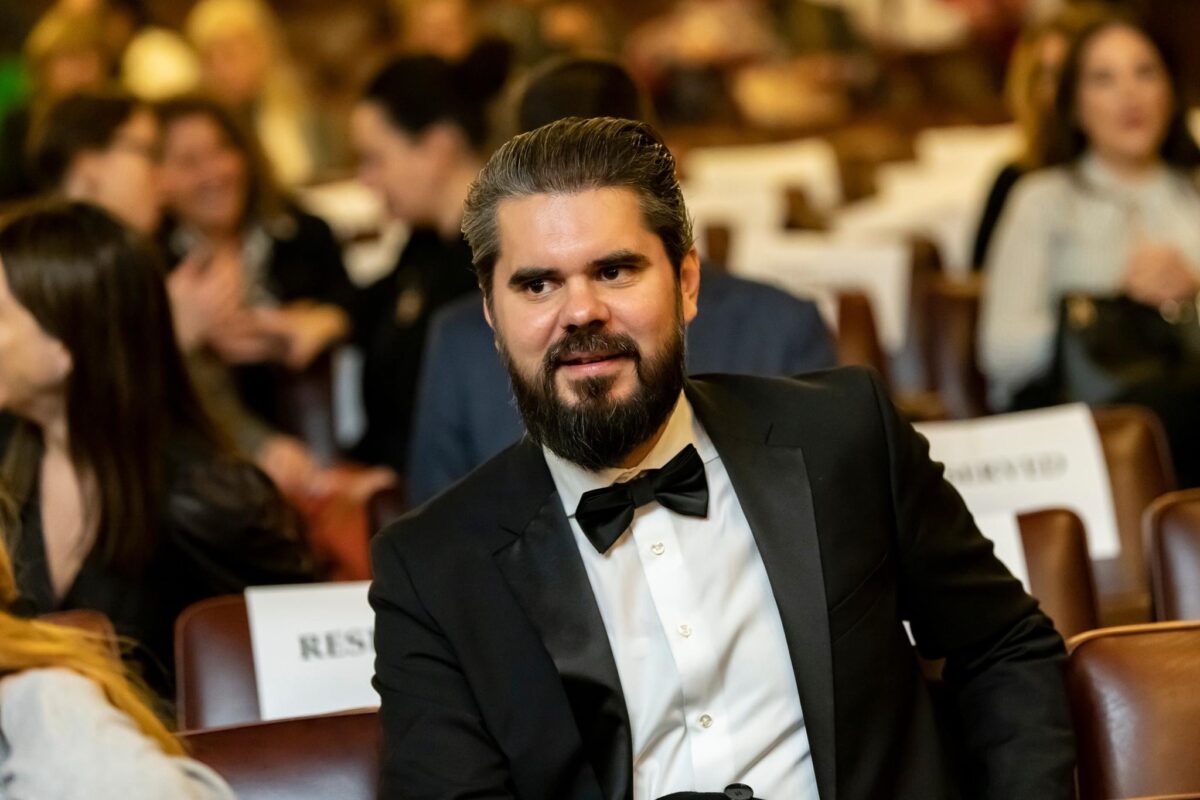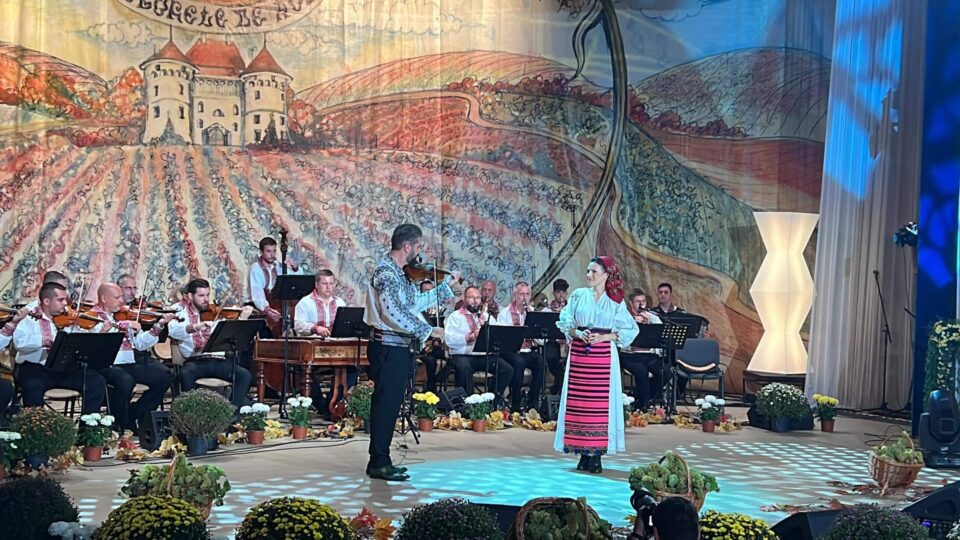The Department of Romanians in Diaspora within the Ministry of Foreign Affairs issues year-round calls to fund projects of Romanians living abroad
 A young Romanian musician breathes life into the tissue of Romanian culture in Serbia by chairing the biggest Romanian orchestra on this side of the border as well as the Zrenjanin Philharmonic and the Grand Festival of Folklore of Romanians from Vojvodina.
A young Romanian musician breathes life into the tissue of Romanian culture in Serbia by chairing the biggest Romanian orchestra on this side of the border as well as the Zrenjanin Philharmonic and the Grand Festival of Folklore of Romanians from Vojvodina.
By: Andrej Klemenčič
You spend your time between Novi Sad, Zrenjanin, and Ečka where you have a studio. What is it that you do there?
I have one of the acoustically best studios in the country. The idea was to make a space where my students could hear themselves play. Practices at home are one thing, but it is completely different when a performer can hear the results immediately after performing. This immediate feedback gives the performer valuable insight. The second reason was my chairing of the National Orchestra of Romanians in Vojvodina which has played in almost all cities in Romania, and still does, very, very successfully. Many soloists wanted to have quality audio recordings. In the 80s and 90s, there were the Slovakian-Hungarian and Romanian-Serbian orchestras, with which many leading Romanian soloists recorded their records, tapes, and CDs.
Apart from the studio and the orchestra, your connection to Romania is presiding the Grand Festival of Folklore of Romanians from Vojvodina.
Indeed. This is one of the oldest Romanian festivals in the world. This year marks the 64th edition. In 2018, to mark the 100th anniversary of the Unification of Romania, the then president of the country Klaus Iohannis awarded the festival a medal for its contribution to culture. This festival gathers up to 3,000 participants. It takes place in August, changing location. This year, it takes place in Grebenac, next to Bela Crkva.
All my education was geared towards being a good example of playing Romanian national music at the highest level
How do you as a representative of the Romanian national minority, feel the presence of Romania in Serbia?
At some moments, this support is stronger, sometimes, less so. Recently, we have had the strongest surge of this support for as long as I can recall.
How is this support visible?
The Department of Romanians in Diaspora within the Ministry of Foreign Affairs issues year-round calls to fund projects of Romanians living abroad. The amounts are generous. The Romanian state gives 50%, and we have to provide the rest. Financing from Serbia, for that second half, would not be sufficient, so we need to find other means, including sponsorships. This support is a strong wind at the back to the events supported enabling them to maintain the level they are on today.
You head a major festival, an orchestra. One might say that you are at the very forefront of Romanian culture in Serbia. You were brought up in a Romanian-speaking family. Did this desire to spearhead the culture of Romanians in Serbia spring during your growing up?
It is, in fact, the other way around. It was the Romanian music that made me do what I do.
 How come?
How come?
In my house, for as long as I can remember, Romanian folk music was present. Through my grandfather and my father, who chaired a folklore ensemble, the music, and the folklore have always been there. I knew, growing up, that what I wanted to do was to play that music. So, my father bought me a saxophone, which is a typical instrument in Romanian folk music. I passed the entrance exam to the music school, but my name was not on the list the day the classes were supposed to start. When my father called the school head, the director told him I was too young for the saxophone, but the violin was an option. That instrument has been with me since. All my education was geared towards having the best possible technique, and the most knowledge to be a good example of playing the Romanian national music at the highest level possible. So, I became a part of the Štefan Štefu Culture and Arts Association, and I created a small orchestra and a choir.
This was when you were how old?
Fifteen.
What an early time to become a director.
I was at school in 1999 and the schools were called off during the bombing. A church cantor then came to work with the kids, so we could sing in church for Easter. So, within that church, there was a choir, and to go through the repertoire, they needed someone who knew how to read sheet music. And just like that, they suggested I chaired the choir. This is how the orchestra and the choir came to be, and also during my time at the secondary school, I tried to create a mini-orchestra. All this has to do with my growing up. I come from Ečka, a small environment. Zrenjanin is a municipality, which also did not have an orchestra or cultural events at the time. This bothered me because I knew there was potential, but people simply did not want to deal with setting something up. And so it happened that in Zrenjanin, the first place with the philharmonic in Serbia dating back to 1899, I started, upon my initiative, a philharmonic orchestra 60 years after the original one had stopped playing. This orchestra of ours is playing all over Europe.
In Romania, practically every town has a symphonic orchestra
Would this make Zrenjanin the smallest place in Europe with a philharmonic?
Not at all. In Romania, practically every town has a symphonic orchestra, and every city of more than 70-80,000 people even has an opera. As well as a philharmonic.
How come there is such an extremely high level of culture-consciousness there?
Because it is a need. It isn’t conscious. I did not consciously go about creating the orchestra, but I simply followed the need.
There is an interesting trend when people finish classical music, and ballet schools in Western Europe, they go to Romania for work. How do you explain this privileged position of Romania and one could even go as far as to say East Europe when it comes to culture?
Because there is a consciousness that one must invest in culture. Romania also had George Enescu, a world-famous composer, who also contributed to classical music awareness in the country. I would like things in Serbia to move in the direction of raising cultural awareness.
And what is the every day of Romanians in Serbia? How does the Romanian community in Serbia breathe nowadays?
I think that the Romanian community feels a slight pressure from the divisions brought about by the nowadays politics. The founding of the national councils is subject to political currents. I tried to help in the Romanian one, but I am apolitical, so it made no sense to continue.
And privately, how do the Romanians live in Serbia?
These political divisions are also mirrored on the private level. Political allegiance only reduces the enthusiasm when it comes to culture workers. I believe they should stay beyond politics if they work with their hearts and want to contribute to the development of culture.